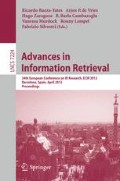Abstract
Today, searchers exploring the World Wide Web have come to expect enhanced search interfaces – query completion and related searches have become standard. Here we propose a Formal Concept Analysis lattice as an underlying domain model to provide a source of query refinements. The initial lattice is constructed using NLP. User clicks on documents, seen as implicit user feedback, are harnessed to adapt it. In this paper, we explore the viability of this adaptation process and the results we present demonstrate its promise and limitations for proposing initial effective refinements when searching the diverse WWW domain.
Access this chapter
Tax calculation will be finalised at checkout
Purchases are for personal use only
Preview
Unable to display preview. Download preview PDF.
References
Carpineto, C., Romano, G.: Exploiting the Potential of Concept Lattices for Information Retrieval with CREDO. Journal of Universal Computer Science 10(8), 985–1013 (2004)
Fonseca, B.M., Golgher, P.B., de Moura, E.S., Pôssas, B., Ziviani, N.: Discovering Search Engine Related Queries Using Association Rules. Journal of Web Engineering 2(4), 215–227 (2004)
Ganter, B., Wille, R.: Formal Concept Analysis. Mathematical Foundations. Springer, Berlin (1999)
Radlinski, F., Joachims, T.: Query Chains: learning to rank from implicit feedback. In: 11th ACM SIGKDD International Conference on Knowledge Discovery in Data Mining, pp. 239–248. ACM, New York (2005)
Sanderson, M., Croft, B.: Deriving concept hierarchies from text. In: 22nd Annual International ACM SIGIR Conference on Research and Development in Information Retrieval, pp. 206–213. ACM, New York (1999)
Author information
Authors and Affiliations
Editor information
Editors and Affiliations
Rights and permissions
Copyright information
© 2012 Springer-Verlag Berlin Heidelberg
About this paper
Cite this paper
Lungley, D., Kruschwitz, U., Song, D. (2012). Learning Adaptive Domain Models from Click Data to Bootstrap Interactive Web Search. In: Baeza-Yates, R., et al. Advances in Information Retrieval. ECIR 2012. Lecture Notes in Computer Science, vol 7224. Springer, Berlin, Heidelberg. https://doi.org/10.1007/978-3-642-28997-2_56
Download citation
DOI: https://doi.org/10.1007/978-3-642-28997-2_56
Publisher Name: Springer, Berlin, Heidelberg
Print ISBN: 978-3-642-28996-5
Online ISBN: 978-3-642-28997-2
eBook Packages: Computer ScienceComputer Science (R0)

